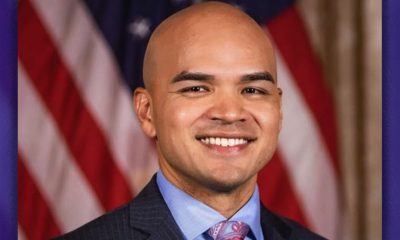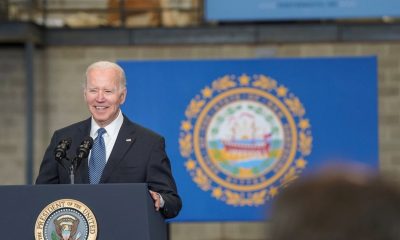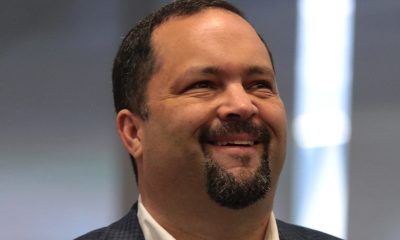Politics
Holder Argues for Success of Drug Sentencing Policies

In this Feb. 11, 2015 file photo, Attorney General Eric Holder speaks to law enforcement officers and guests in the Old Executive Office Building on the White House Complex in Washington. The share of federal drug offenders who received harsh mandatory minimum sentences has plunged in the past year, according to figures obtained by The Associated Press that Holder plans to cite Tuesday in arguing for the success of his criminal justice policies. Experts credit Holder for helping raise sentencing policy as a public issue, but they also say it’s hard to gauge how much of the impact is directly attributable to his actions. (AP Photo/Pablo Martinez Monsivais, File)
ERIC TUCKER, Associated Press
WASHINGTON (AP) — Federal prosecutors are changing the way drug defendants are charged and punished, Attorney General Eric Holder said Tuesday, unveiling statistics that show sentences are increasingly being based less on rigid formulas and more on the circumstances of each crime.
It’s a signature issue for Holder’s legacy as he prepares to leave the Justice Department in a matter of weeks as its first African American attorney general.
New data compiled by the U.S. Sentencing Commission show a shift over the last year in which prosecutors steer away from seeking the harshest punishments for low-level drug offenders and redirect their resources to go after more violent criminals.
The figures show federal prosecutors pursued mandatory minimum punishments in roughly 51 percent of drug cases, the lowest rate on record, in the year that ended last September. That was down from 64 percent the year before.
Overall, the number of federal drug trafficking prosecutions dropped by 6 percent during the same period, which Holder said was proof that prosecutors are getting pickier in the federal cases they bring.
“The changes that we have implemented are firmly taking hold,” Holder said in a speech at the National Press Club. “And our key reforms appear to be successful by every measure that we have taken and that we have seen so far.”
For decades, law enforcement authorities have measured success by the numbers of convictions and the length of prison terms, an approach seen as particularly useful during the 1980s-era crack epidemic. In keeping with that stance, a 2003 memo from then-Attorney General John Ashcroft directed prosecutors to charge the most serious provable crime against defendants.
But in six years as attorney general, Holder sought limits on long drug sentences as a matter of fairness and cost and promoted a sentencing regime based more on the facts of a case and less on formulas. A key goal was to help limit an overcrowded prison population bloated with drug offenders.
In August 2013, he announced a package of changes called “Smart on Crime,” which directed prosecutors to avoid charging non-violent drug offenders with crimes that carry mandatory minimum sentences — rigid, usually years-long punishments that are generally dictated by drug quantity and restrict a judge’s discretion.
Justice Department prosecutors have expressed concern that gestures of leniency would limit their leverage to negotiate plea deals. But in the last fiscal year the percentage of guilty pleas has held steady, along with the percentage of drug defendants who received credit for cooperation, which the Justice Department says belies the prosecutors’ concerns.
Even as the overall number of federal drug trafficking prosecutions dropped from 22,215 to 20,824 — a 6 percent decline — the average suggested minimum prison term in those cases rose from 96 months to 98 months, which Holder maintained proves prosecutors are focusing on more serious crimes.
Still, it’s not clear from the limited snapshot whether the numbers reflect a new normal, or will continue to fluctuate as they have for most of the last decade.
And while experts credit Holder for helping raise sentencing policy as a public issue, some also say it’s hard in a complex and interrelated criminal justice system to gauge how much is directly attributable to the attorney general’s policy shift.
“I think it’s impossible to identify one factor that is going to be the cause of all the change,” said Julie Stewart, president of Families Against Mandatory Minimums. “But I don’t think it’s wrong to give Holder some credit for caring about who’s in prison or trying to get his U.S. Attorneys not to overcharge.”
Even before Holder’s policy announcement 18 months ago, long drug sentences were already facing scrutiny and some downward-pointing trends were already starting to take shape.
In the last decade, for instance, the U.S. Supreme Court made sentencing guideline ranges advisory rather than mandatory and President Barack Obama signed a law to cut crack cocaine penalties. Last year, the Sentencing Commission — an independent panel that sets sentencing policy — slashed guideline ranges for drug crimes and applied those changes retroactively.
Though Holder’s departure is imminent, the Justice Department budget proposal includes funds to study the new policy’s impact over the next year.
His expected successor, Loretta Lynch — the top federal prosecutor for parts of New York — voiced general support for “Smart on Crime” at her confirmation hearings but faced only limited questions about drug sentencing policy, a likely indication that an issue once seen as politically volatile has now gained far more mainstream acceptance.
“To the extent that he’s helping to open up the climate and helping to give a greater level of comfort to mainstream lawmakers, that would be one of the most significant long-term effects of his tenure,” said Marc Maurer, executive director of the Sentencing Project.
____
Associated Press writer Michael Tarm in Chicago contributed to this report.
Copyright 2015 The Associated Press. All rights reserved. This material may not be published, broadcast, rewritten or redistributed.
Bay Area
MAYOR BREED ANNOUNCES $53 MILLION FEDERAL GRANT FOR SAN FRANCISCO’S HOMELESS PROGRAMS
San Francisco, CA – Mayor London N. Breed today announced that the U.S. Department of Housing and Urban Development (HUD) has awarded the city a $53.7 million grant to support efforts to renew and expand critical services and housing for people experiencing homelessness in San Francisco.

FOR IMMEDIATE RELEASE:
Wednesday, January 31, 2024
Contact: Mayor’s Office of Communications, mayorspressoffice@sfgov.org
***PRESS RELEASE***
MAYOR BREED ANNOUNCES $53 MILLION FEDERAL GRANT FOR SAN FRANCISCO’S HOMELESS PROGRAMS
HUD’s Continuum of Care grant will support the City’s range of critical services and programs, including permanent supportive housing, rapid re-housing, and improved access to housing for survivors of domestic violence
San Francisco, CA – Mayor London N. Breed today announced that the U.S. Department of Housing and Urban Development (HUD) has awarded the city a $53.7 million grant to support efforts to renew and expand critical services and housing for people experiencing homelessness in San Francisco.
HUD’s Continuum of Care (CoC) program is designed to support local programs with the goal of ending homelessness for individuals, families, and Transitional Age Youth.
This funding supports the city’s ongoing efforts that have helped more than 15,000 people exit homelessness since 2018 through City programs including direct housing placements and relocation assistance. During that time San Francisco has also increased housing slots by 50%. San Francisco has the most permanent supportive housing of any county in the Bay Area, and the second most slots per capita than any city in the country.
“In San Francisco, we have worked aggressively to increase housing, shelter, and services for people experiencing homelessness, and we are building on these efforts every day,” said Mayor London Breed. “Every day our encampment outreach workers are going out to bring people indoors and our City workers are connecting people to housing and shelter. This support from the federal government is critical and will allow us to serve people in need and address encampments in our neighborhoods.”
The funding towards supporting the renewal projects in San Francisco include financial support for a mix of permanent supportive housing, rapid re-housing, and transitional housing projects. In addition, the CoC award will support Coordinated Entry projects to centralize the City’s various efforts to address homelessness. This includes $2.1 million in funding for the Coordinated Entry system to improve access to housing for youth and survivors of domestic violence.
“This is a good day for San Francisco,” said Shireen McSpadden, executive director of the Department of Homelessness and Supportive Housing. “HUD’s Continuum of Care funding provides vital resources to a diversity of programs and projects that have helped people to stabilize in our community. This funding is a testament to our work and the work of our nonprofit partners.”
The 2024 Continuum of Care Renewal Awards Include:
- $42.2 million for 29 renewal PSH projects that serve chronically homeless, veterans, and youth
- $318,000 for one new PSH project, which will provide 98 affordable homes for low-income seniors in the Richmond District
- $445,00 for one Transitional Housing (TH) project serving youth
- $6.4 million dedicated to four Rapid Rehousing (RRH) projects that serve families, youth, and survivors of domestic violence
- $750,00 for two Homeless Management Information System (HMIS) projects
- $2.1 million for three Coordinated Entry projects that serve families, youth, chronically homeless, and survivors of domestic violence
In addition, the 2023 CoC Planning Grant, now increased to $1,500,000 from $1,250,000, was also approved. Planning grants are submitted non-competitively and may be used to carry out the duties of operating a CoC, such as system evaluation and planning, monitoring, project and system performance improvement, providing trainings, partner collaborations, and conducting the PIT Count.
“We are very appreciative of HUD’s support in fulfilling our funding request for these critically important projects for San Francisco that help so many people trying to exit homelessness,” said Del Seymour, co-chair of the Local Homeless Coordinating Board. “This funding will make a real difference to people seeking services and support in their journey out of homelessness.”
In comparison to last year’s competition, this represents a $770,000 increase in funding, due to a new PSH project that was funded, an increase in some unit type Fair Market Rents (FMRs) and the larger CoC Planning Grant. In a year where more projects had to compete nationally against other communities, this represents a significant increase.
Nationally, HUD awarded nearly $3.16 billion for over 7,000 local homeless housing and service programs including new projects and renewals across the United States.
Activism
Oakland Post: Week of April 17 – 23, 2024
The printed Weekly Edition of the Oakland Post: Week of April 17 – 23, 2024

To enlarge your view of this issue, use the slider, magnifying glass icon or full page icon in the lower right corner of the browser window. ![]()
Barbara Lee
Congresswoman Barbara Lee Issues Statement on Deaths of Humanitarian Aid Volunteers in Gaza
On April 2, a day after an Israeli airstrike erroneously killed seven employees of World Central Kitchen (WCK), a humanitarian organization delivering aid in the Gaza Strip, a statement was release by Rep. Barbara Lee (D-CA-12). “This is a devastating and avoidable tragedy. My prayers go to the families and loved ones of the selfless members of the World Central Kitchen team whose lives were lost,” said Lee.

By California Black Media
On April 2, a day after an Israeli airstrike erroneously killed seven employees of World Central Kitchen (WCK), a humanitarian organization delivering aid in the Gaza Strip, a statement was release by Rep. Barbara Lee (D-CA-12).
“This is a devastating and avoidable tragedy. My prayers go to the families and loved ones of the selfless members of the World Central Kitchen team whose lives were lost,” said Lee.
The same day, it was confirmed by the organization that the humanitarian aid volunteers were killed in a strike carried out by Israel Defense Forces (IDF). Prior to the incident, members of the team had been travelling in two armored vehicles marked with the WCF logo and they had been coordinating their movements with the IDF. The group had successfully delivered 10 tons of humanitarian food in a deconflicted zone when its convoy was struck.
“This is not only an attack against WCK. This is an attack on humanitarian organizations showing up in the direst situations where food is being used as a weapon of war. This is unforgivable,” said Erin Gore, chief executive officer of World Central Kitchen.
The seven victims included a U.S. citizen as well as others from Australia, Poland, the United Kingdom, Canada, and Palestine.
Lee has been a vocal advocate for a ceasefire in Gaza and has supported actions by President Joe Biden to airdrop humanitarian aid in the area.
“Far too many civilians have lost their lives as a result of Benjamin Netanyahu’s reprehensible military offensive. The U.S. must join with our allies and demand an immediate, permanent ceasefire – it’s long overdue,” Lee said.
-

 Activism4 weeks ago
Activism4 weeks agoOakland Post: Week of March 27 – April 2, 2024
-

 #NNPA BlackPress4 weeks ago
#NNPA BlackPress4 weeks agoCOMMENTARY: D.C. Crime Bill Fails to Address Root Causes of Violence and Incarceration
-

 #NNPA BlackPress4 weeks ago
#NNPA BlackPress4 weeks agoFrom Raids to Revelations: The Dark Turn in Sean ‘Diddy’ Combs’ Saga
-

 #NNPA BlackPress4 weeks ago
#NNPA BlackPress4 weeks agoCOMMENTARY: Lady Day and The Lights!
-

 #NNPA BlackPress4 weeks ago
#NNPA BlackPress4 weeks agoMayor, City Council President React to May 31 Closing of Birmingham-Southern College
-

 #NNPA BlackPress4 weeks ago
#NNPA BlackPress4 weeks agoBaltimore Key Bridge Catastrophe: A City’s Heartbreak and a Nation’s Alarm
-

 #NNPA BlackPress4 weeks ago
#NNPA BlackPress4 weeks agoBaltimore’s Key Bridge Struck by Ship, Collapses into Water
-

 #NNPA BlackPress4 weeks ago
#NNPA BlackPress4 weeks agoBeloved Actor and Activist Louis Cameron Gossett Jr. Dies at 87





















































